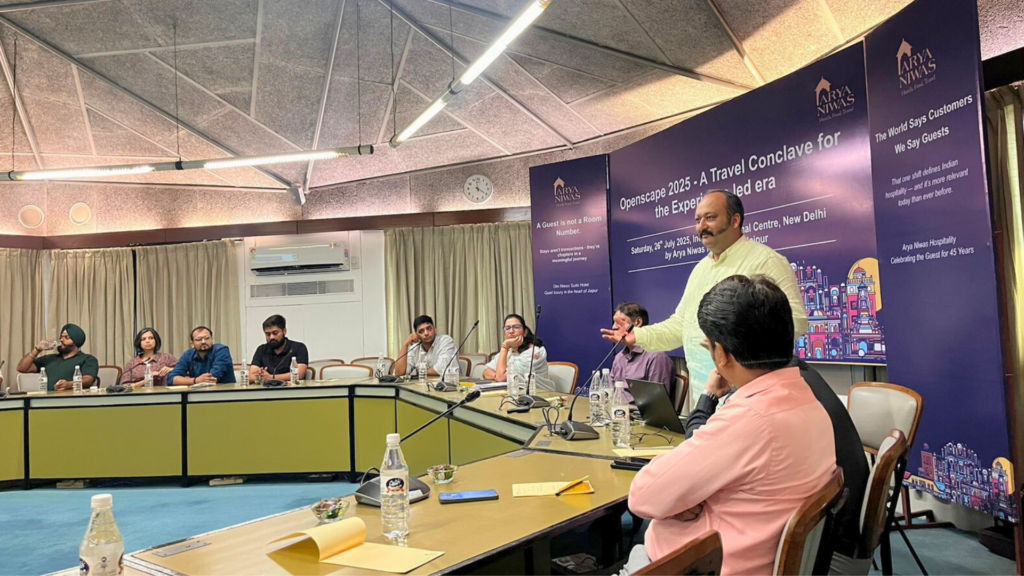AI in Travel
Canadians Embrace AI For Travel but Hesitate To Fully Trust It

Friday, July 25, 2025
Canadians are becoming more enthusiastic about artificial intelligence (AI) as they believe in the role it can play in the future of travel, according to findings from the latest Booking.com. According to new research from Adobe called the Global AI Sentiment Report, the largest of its kind surveying 37,000 consumers across 33 markets, 81% of Canadian travelers are enthusiastic about the possibilities for AI in travel, 78% want to use it for future travel planning. But, for all this excitement, there is a big obstacle to overcome – trust in AI. Only 4% of Canadians say they would trust what AI recommends.
“Whether it’s clicking five, six, seven times, you’re looking at a calendar, and you’re choosing travel based on availability. com, underscored the game-changing role AI is playing in travel: “Generative AI is one of the most exciting and powerful tools we’ve seen to inspire our customers and help them dream about the possibilities for their next trip. It’s a major advancement to be able to ‘try on’ a new experience before buying.” The tech is still evolving and getting ever better, said Waters, but AI is also upping the ante when it comes to expectations for what travelers want from their experiences, in everything from service to personalization.
Travel’s New Friend Is AI
AI is emerging as a big player in trip planning for Canadians, says the report. More than 61% of Canadian travelers anticipate that AI is going to make real-time trip planning a reality in the coming years, with close to half (48%) using some form of AI in their travel experience already. Whether it be researching destinations (39%) and restaurant recommendations (35%) or even finding cultural activities (34%), AI can effectively lend a hand to those who are often crunched for time when it comes to planning a trip.
Perhaps a true measure of changing attitudes is that AI chatbots are now considered to be more trustworthy travel planners than colleagues or influencers. The data indicated that 17% of Canadians will trust AI-generated suggestions over personal recommendations, with only 13% trusting their co-workers and 9% having confidence in influencers.
Canadians needing help on the go while travelling depend more and more on AI. Most popular use cases are translation services (54%), in-destination activities suggestions (40%), restaurant recommendations (38%), and navigation support (37%). Additionally, photo editing (32%) has become a popular application for AI post-trip, highlighting how the technology can be used for the different stages of travel.
Canadians Want Help, Not Autonomy
And while AI is increasingly being called into play in travel, many Canadians still want a human in the loop. Although 97% of Canadians employ AI search and 61% interact directly with generative AI tools, most are wary of letting AI make decisions for them. Just 7% of Canadians are OK with AI making decisions on its own, while 43% are always fact-checking the results and 21% doing so on occasion.
This reticence is, in part, due to a fear of AI’s impersonality. And almost half of Canadians (47%) believe AI is not warm and personal in the way that human interaction is. This mindset is indicative of an increasing demand for support rather than complete independence, particularly in something as human and personal as travel planning.
“AI is not able to make that personal connection, so there is a lot of resistance.” In the case of AI, which is great for booking flights and suggesting restaurants, Canadians still appreciate the human touch, as well as the quirks that go along with it. The fine line between AI help and human contact, however, is only time will tell how that plays out in the world of travel.
Canadians Want AI for Good
Despite remaining skepticism, many Canadians see the value of AI when it’s used ethically. More than half (54 per cent) of Canadians are grateful for AI for the ease of travel that it creates, and 61 per cent appreciate the AI-generated recommendations that help avoid crowded destinations/peak travel times. There is also a desire for AI to create experiences that benefit local communities (identified by 52%), indicating a desire for AI to play a positive role within travel.
That sentiment speaks to a larger craving for AI to be in line with travelers’ values, including sustainability and responsible tourism. Canadians have never been more conscious of how their travel decisions affect the environment and local communities, and a majority think AI could be the tool they need to make better decisions.
Variations between Countries regarding Confidence and Excitement
The report identifies regional variances when it comes to AI adoption and trust. Latin America is the most excited region of the world for AI, whereas North America (which includes Canada) is more skeptical. While 81% of Canadians and Americans feel enthusiastic about AI, 32% lack confidence in the information it produces, which was the highest reported level of distrust around the world.
The split in opinion around AI is reflected more broadly in attitudes towards the technology. The study found five predominant attitudes toward AI: Enthusiast, Advocate, Cautious, Skeptic, and Detractor. One in five people want to know if their curiosity should be piqued about AI, but 42% of them are wary of its use.
AI on the Road Ahead for Travel
Going forward, AI for travel is set to expand – particularly as more travelers recognize its value in the face of issues around trust and personal connection. For Canadians, AI showcases what the future of travel will look like, marked by enhanced efficiency, personalized experiences, all while being more accessible than ever.
Nevertheless, as the technology evolves, travel companies will need to consider trust and autonomy issues. With a focus on transparency, safety, and education, AI can be the ideal travel companion, one that brings convenience and peace of mind for travelers.
As the future of AI takes shape, travelers are curious to see how it can be harnessed to complement, not replace, the human touch in the travel experience. The pendulum between innovation and trust will therefore be critical in the successful migration of AI in the world of travel.
(Source: Booking.com, Statistics Canada)
AI in Travel
With focus on AI, sustainable travel Arya Niwas organises Openscapes 2025 in New Delhi

The opportunities and challenges that issues like artificial intelligence, sustainability and experiential travel pose to the tourism industry in India and overseas were highlighted at Openscapes 2025, a travel conclave in New Delhi on Saturday.
Organised by Arya Niwas, a hospitality group based in Jaipur, the conclave served as a participative platform to explore transformative ideas for the tourism sector, addressing pressing issues such as sustainability, experiential curation, the role of artificial intelligence (AI), and the integration of responsible practices into the travel experience.
Drawing stakeholders from across India’s hospitality industry, the conclave was organised with the core theme of Projecting India and Rajasthan with a stronger, more meaningful narrative.
“This is the first conclave. It is called Openscapes. We hope that we will be having more such dialogue-based conclaves on travel. There is a need for us to behave as one in the travel industry and to move forward together because the ultimate aim is to serve the guests and make the guests win,” Pooja Bansal, Owner and General Manager, Arya Niwas, told India & You on the sidelines of the event.
The urgency of the issues raised at the meeting was underscored by leading tour operators, who highlighted that Indian tourism, particularly in recent years, “has not been sustainable and things have gone really, really bad.”
The conclave drew stakeholders from across India’s hospitality industry
“When we talk about sustainability with experiential tourism, the experience at the grassroot level, meeting local people with a bit of sustainability, offers eye-opening encounters. Yet, there are challenges,” Navneet Arora, Managing Director, VINString Holidays, a travel agency in New Delhi, told India & You.
The meeting illustrated both obstacles and achievements in rural and urban experiential tourism. Operators cited instances where visitors’ immersion in heritage neighbourhoods and private homes fostered mutual pride among locals and tourists. However, they also warned against approaches that leave rural residents feeling like “monkeys in the zoo,” underscoring the necessity of responsible, respectful interaction, something now addressed by ensuring a share of tour proceeds benefit the communities involved. Sustainability, participants argued, extends well beyond eco-friendly rhetoric.
The conclave highlighted innovative tour formats, slow tourism, creative workshops and direct engagement with artisans, as pathways for deeper, more rewarding guest experiences.
“I think that is the call for the future, because automation has to come in. If we are not doing automation today, we are backwards. AI is important. The event opens up eyes for a lot of people. Difficult, but yes, AI and sustainability are important and doable,” Arora added.
“The interpretation of sustainability has become very cliché. This was a session to break that,” said Bansal.
Participants at the Openscapes 2025 called for a sustained dialogue, with suggestions for sector-wide conventions and targetted sessions on marketing and AI and more collaborative initiatives.
AI in Travel
Sabre Corporation’s Strategic Partnership with Christopherson Business Travel and Its Implications for Undervalued Cloud and AI Stocks

Sabre Corporation (NASDAQ: SABR) has long been a cornerstone of the global travel technology sector, but its recent strategic partnership with Christopherson Business Travel marks a pivotal evolution. By leveraging its AI-driven platform and cloud-native infrastructure, Sabre is not only modernizing corporate travel management but also positioning itself as a catalyst for growth in the undervalued travel tech sector. For investors, this collaboration offers a compelling case study in how AI and cloud innovation can unlock long-term value in a niche yet resilient market.
A Strategic Alliance for the Future of Corporate Travel
On July 17, 2025, Sabre announced a multi-year agreement to become Christopherson Business Travel’s primary technology partner. This partnership is more than a transactional arrangement—it’s a strategic alignment of two companies aiming to redefine corporate travel through automation, real-time data, and personalized service. Sabre’s AI-powered tools, including Sabre Red 360, Trip Proposal, and Market Intelligence, will streamline operations for Christopherson, enabling faster decision-making and enhanced client offerings.
The integration of Sabre’s cloud-native infrastructure into Christopherson’s proprietary Andavo platform is particularly noteworthy. This move allows for real-time orchestration of multi-source content (air, hotel, rail, ground) and seamless API-driven integrations, reducing manual effort and improving scalability. As Chad Maughan, CTO of Christopherson, noted, Sabre’s architecture provides the operational flexibility needed to adapt to evolving client demands—a critical advantage in the post-pandemic corporate travel landscape.
Sabre’s Financial Resilience and AI-Driven Growth
Sabre’s financial performance in 2024 underscores its transition from a turnaround story to a growth-oriented entity. Revenue increased to $3 billion, with adjusted EBITDA rising to $517 million—a 54% year-over-year improvement. While IT Solutions revenue dipped due to de-migrations, the Travel Solutions and Distribution segments grew by 4% and 6%, respectively, driven by demand for Sabre’s AI-powered tools.
The company’s market cap of $1.222 billion pales in comparison to AI/cloud giants like Databricks ($62 billion) or Snowflake ($43.6 billion), but this undervaluation reflects Sabre’s niche focus. Its strategic investments in Sabre Mosaic—a modular platform combining AI, cloud, and traditional agent workflows—position it to capture a larger share of the corporate travel market, which is projected to grow as businesses prioritize cost optimization and efficiency.
The AI/Cloud Travel Tech Opportunity
The broader travel tech sector is undergoing a transformation fueled by generative AI. According to Skift Research, AI-driven tools could create a $28 billion+ opportunity for the industry, with applications in personalized itineraries, dynamic pricing, and automated customer service. Sabre’s Automated Exchanges & Refunds and Agency Retailer solutions are already streamlining post-booking processes, reducing manual intervention by up to 70%.
However, Sabre is not alone in the race to monetize AI in travel. Competitors like C3.ai (NYSE: AI), Marvell Technology (NASDAQ: MRVL), and DigitalOcean (DOCN) are also leveraging cloud and AI to drive growth. C3.ai’s predictive analytics tools, for instance, have secured government contracts worth $450 million, while Marvell’s AI-optimized chips are powering data centers for hyperscale providers. Yet, Sabre’s deep vertical integration into travel-specific workflows gives it a unique edge in the corporate travel niche.
Why Sabre Is an Undervalued Investment
Despite its strategic advantages, Sabre remains overlooked by many investors. Its current price-to-earnings ratio (P/E) of 8.5 is significantly lower than the industry average of 18.5, and its hedge fund ownership (11.2%) suggests growing confidence in its AI-driven roadmap. The partnership with Christopherson is a validation of Sabre’s value proposition: it enables the company to scale its AI/Cloud offerings without overhauling existing systems, a critical factor for travel agencies seeking cost-effective modernization.
For investors, the key question is whether Sabre can replicate its success in other verticals. The company’s PowerSuite Cloud platform, which automates operations and integrates NDC content, is already gaining traction among mid-sized travel agencies. If Sabre can expand its footprint in the corporate and leisure travel markets, its revenue could outpace the 10% growth projected by analysts.
Conclusion: A Strategic Bet on AI-Driven Travel
Sabre’s partnership with Christopherson Business Travel is a microcosm of the broader shift toward AI and cloud-native solutions in travel technology. While the company may lack the valuation of tech giants like Microsoft or Google, its focus on vertical-specific innovation and operational efficiency makes it a compelling play for investors seeking exposure to the travel sector’s AI revolution.
For those considering a diversified portfolio, Sabre offers a unique blend of undervaluation and growth potential. However, it should be viewed as a complementary holding to broader AI/cloud stocks like C3.ai or Marvell, rather than a standalone bet. As the travel industry continues to embrace AI-driven automation, Sabre’s ability to deliver scalable, client-centric solutions will likely drive long-term value for both its partners and shareholders.
AI in Travel
AI Travel Tricks: Watch Out for the Road to Nowhere – Herald/Review Media

AI Travel Tricks: Watch Out for the Road to Nowhere Herald/Review Media
Source link
-

 Brand Stories6 days ago
Brand Stories6 days agoBloom Hotels: A Modern Vision of Hospitality Redefining Travel
-

 Brand Stories1 day ago
Brand Stories1 day agoCheQin.ai sets a new standard for hotel booking with its AI capabilities: empowering travellers to bargain, choose the best, and book with clarity.
-

 Destinations & Things To Do7 days ago
Destinations & Things To Do7 days agoUntouched Destinations: Stunning Hidden Gems You Must Visit
-

 AI in Travel7 days ago
AI in Travel7 days agoAI Travel Revolution: Must-Have Guide to the Best Experience
-

 Brand Stories3 weeks ago
Brand Stories3 weeks agoVoice AI Startup ElevenLabs Plans to Add Hubs Around the World
-

 Brand Stories2 weeks ago
Brand Stories2 weeks agoHow Elon Musk’s rogue Grok chatbot became a cautionary AI tale
-

 Destinations & Things To Do1 day ago
Destinations & Things To Do1 day agoThis Hidden Beach in India Glows at Night-But Only in One Secret Season
-

 Asia Travel Pulse3 weeks ago
Asia Travel Pulse3 weeks agoLooking For Adventure In Asia? Here Are 7 Epic Destinations You Need To Experience At Least Once – Zee News
-

 AI in Travel3 weeks ago
AI in Travel3 weeks ago‘Will AI take my job?’ A trip to a Beijing fortune-telling bar to see what lies ahead | China
-

 Brand Stories3 weeks ago
Brand Stories3 weeks agoChatGPT — the last of the great romantics













You must be logged in to post a comment Login